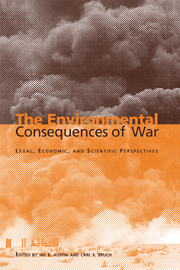Book contents
- Frontmatter
- Contents
- List of illustrations
- List of tables
- List of contributors
- Acknowledgements
- Foreword by Klaus Toepfer
- Introduction
- Part I General principles
- Part II The legal framework
- Part III Assessing the impacts – scientific methods and issues
- Introduction
- 11 Scientific assessment of the long-term environmental consequences of war
- 12 The Gulf War impact on the terrestrial environment of Kuwait: an overview
- 13 War-related damage to the marine environment in the ROPME Sea Area
- 14 War and biodiversity: an assessment of impacts
- Introduction
- 15 Tracking the four horsemen: the public health approach to the impact of war and war-induced environmental destruction in the twentieth century
- 16 Defoliants: the long-term health implications
- 17 The impact of military preparedness and militarism on health and the environment
- 18 War and infectious diseases: international law and the public health consequences of armed conflict
- Part IV Valuing the impacts – economic methods and issues
- Part V Prospects for the future
- Index
Introduction
Published online by Cambridge University Press: 04 August 2010
- Frontmatter
- Contents
- List of illustrations
- List of tables
- List of contributors
- Acknowledgements
- Foreword by Klaus Toepfer
- Introduction
- Part I General principles
- Part II The legal framework
- Part III Assessing the impacts – scientific methods and issues
- Introduction
- 11 Scientific assessment of the long-term environmental consequences of war
- 12 The Gulf War impact on the terrestrial environment of Kuwait: an overview
- 13 War-related damage to the marine environment in the ROPME Sea Area
- 14 War and biodiversity: an assessment of impacts
- Introduction
- 15 Tracking the four horsemen: the public health approach to the impact of war and war-induced environmental destruction in the twentieth century
- 16 Defoliants: the long-term health implications
- 17 The impact of military preparedness and militarism on health and the environment
- 18 War and infectious diseases: international law and the public health consequences of armed conflict
- Part IV Valuing the impacts – economic methods and issues
- Part V Prospects for the future
- Index
Summary
Introduction
Scientific assessment of the environmental impacts of wrongful actions forms the evidentiary basis for any case – wartime or peacetime, civil or criminal – by establishing the nature and extent of the damages. Assessment of impacts also provides a basis for rehabilitation. The methods for evaluating damages and appropriate restoration measures are as numerous and varied as the impacts themselves. Experience has shown, however, that the reliability of most of these methods is problematic at best. The chapters in this section provide an overview of the various ecological consequences of wars, relying primarily on examples from the 1990–91 Gulf War. They also provide valuable insight into the issues surrounding scientific methods for predicting and assessing these consequences.
Most impacts of war are multi-faceted. Aerial bombardment, for example, obviously has dire effects on terrestrial ecosystems. However, it also often destroys civilian infrastructure, such as sewage treatment facilities and electrical plants, which is vital to maintaining clean water and air. Classifying such impacts can be extremely difficult. In his chapter, Asit Biswas categorizes the various impacts he addresses by media – water, land, air, and other natural resources – although he acknowledges that such boundaries are necessarily somewhat artificial. Similarly, Samira Omar et al. and Mahmood Abdulraheem focus their chapters on the impacts of the 1990–91 Gulf War on the terrestrial and marine resources of Kuwait, respectively. Finally, Jeffrey McNeely discusses how wartime impacts affect biodiversity. In the end, a very intricate overall picture emerges, one that reflects the complex nature of war itself.
- Type
- Chapter
- Information
- The Environmental Consequences of WarLegal, Economic, and Scientific Perspectives, pp. 297 - 302Publisher: Cambridge University PressPrint publication year: 2000



